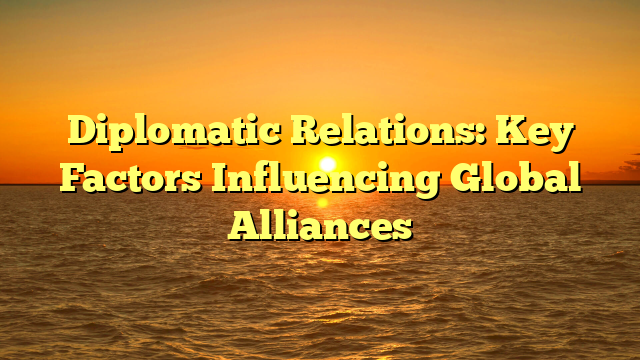Diplomatic Relations
In our more and more interconnected world, diplomatic relations play a pivotal function in shaping international alliances. These relationships are the spine of worldwide cooperation, affecting commerce, safety, cultural change, and way more. As nations navigate the complexities of world politics, understanding the important thing components influencing diplomatic relations is important. This text explores what drives these relationships and gives actionable insights for each policymakers and residents.
What Are Diplomatic Relations?

Diplomatic relations check with the formal interactions between international locations, facilitated by diplomatic representatives reminiscent of ambassadors and consuls. These interactions can vary from discussions on commerce agreements to resolving conflicts and collaborating in worldwide organizations. Efficient diplomatic relations can result in improved commerce alternatives, enhanced safety cooperation, and cultural understanding.
Nonetheless, the panorama of diplomatic relations is at all times shifting, influenced by quite a few components that may each strengthen and undermine international alliances.
Historic Context: A Basis for Diplomatic Relations
The previous performs an important function in shaping present diplomatic relations. Historic occasions, treaties, and conflicts typically dictate the best way nations work together as we speak. As an illustration, the aftermath of World Battle II led to the institution of the United Nations, a company designed to advertise peace and cooperation, thus influencing diplomatic relations worldwide.
Case Research: The USA and Japan
A major instance is the evolving diplomatic relationship between the US and Japan. Following World Battle II, the 2 nations rebuilt their ties, culminating within the Treaty of Mutual Cooperation and Safety in 1960. This treaty has allowed them to take care of a robust alliance that continues to adapt to altering geopolitical dynamics.
Financial Interdependence: A Catalyst for Alliances
Financial components are among the many most vital influences on diplomatic relations. International locations that interact in intensive commerce or share financial pursuits are sometimes extra prone to develop sturdy diplomatic ties. Financial interdependence can foster cooperation, mitigate conflicts, and encourage nations to take care of steady relations.
Commerce Agreements as Instruments for Diplomatic Relations
Commerce agreements such because the North American Free Commerce Settlement (NAFTA), now changed by the United States-Mexico-Canada Settlement (USMCA), illustrate how financial cooperation can improve diplomatic relations. These agreements not solely present financial advantages but in addition pave the best way for stronger political alliances.
How Does Financial Affect Work?
-
-
Commerce Relations: International locations with excessive commerce volumes are inclined to expertise deeper diplomatic relations attributable to mutual financial advantages.
-
-
-
Funding Alternatives: Overseas direct funding (FDI) typically encourages nations to stabilize relations to guard their financial investments.
-
-
- Useful resource Alternate: International locations wealthy in particular assets could set up alliances to safe constant provide chains.
Strategic Pursuits: A Driving Pressure
Strategic pursuits, together with nationwide safety and army collaborations, play an important function in shaping diplomatic relations. Nations typically type alliances primarily based on mutual safety considerations, particularly in areas susceptible to battle.
Navy Alliances and Protection Pacts
Navy alliances, reminiscent of NATO, display how safety considerations can drive international locations into nearer diplomatic ties. These friendships are sometimes multi-faceted, involving protection agreements that enable allied nations to collaborate on army operations, mutual safety, and intelligence sharing.
Examples of Strategic Alliances
-
-
NATO (North Atlantic Treaty Group): Fashioned in 1949, this army alliance has solidified diplomatic relations amongst its member international locations, primarily in response to potential threats from rival nations.
-
-
- The CSTO (Collective Safety Treaty Group): This alliance consists primarily of former Soviet states and focuses on mutual protection and safety.
Cultural Alternate: Smooth Energy and Its Impression
Whereas financial and strategic components are important, cultural relations additionally play a vital function in diplomatic relations. The idea of “comfortable energy,” popularized by Joseph Nye, refers back to the capacity of a rustic to affect others by cultural means relatively than coercive techniques.
The Position of Cultural Diplomacy
Cultural diplomacy contains exchanges of artwork, training, and tourism, fostering mutual respect and understanding. International locations that put money into cultural relations typically discover that it enhances their diplomatic ties.
Cultural Alternate Initiatives
-
-
Instructional Packages: Scholarships and change scholar applications assist construct bridges between nations, making a technology that values cross-border relationships.
-
-
- Artwork and Movie Initiatives: Collaborations in arts and cinema can interact residents in a dialogue, selling empathy and cooperation.
Political Ideologies: Shaping Alliances and Conflicts
Ideological components, reminiscent of governance types and political methods, can considerably influence diplomatic relations. Nations with related ideologies typically discover it simpler to type alliances, whereas these with contrasting values could face challenges.
The Affect of Democratic and Authoritarian Regimes
International locations ruled by democratic ideas could lean in direction of forming alliances with different democracies, selling human rights and governance values. Conversely, authoritarian regimes could search alliances primarily based on mutual pursuits, typically sidelining ideological concerns in favor of sensible advantages.
Actual-World Examples:
-
-
Democratic Alliances: The European Union (EU) is a first-rate instance of a bunch of democracies pursuing nearer diplomatic relations primarily based on related values.
-
-
- Authoritarian Commerce Agreements: Nations like China and Russia could forge alliances primarily based on strategic pursuits, no matter differing political ideologies.
Globalization: The New Period of Diplomatic Relations
Globalization has radically remodeled diplomatic relations by making the world extra interconnected. Info flows, technological developments, and international commerce have altered how nations work together, emphasizing the necessity for diplomacy that responds swiftly to international challenges.
Local weather Change and World Cooperation
One space the place globalization necessitates stronger diplomatic relations is local weather change. Nations should cooperate to deal with environmental points, creating alliances that target shared international objectives relatively than nationwide pursuits alone.
Actionable Insights for Strengthening Diplomatic Relations
As we transfer ahead, the complexity of diplomatic relations requires concerted efforts by nations to construct and keep alliances. Listed here are some actionable insights:
-
-
Put money into Financial Partnerships: Nations ought to prioritize commerce agreements that encourage mutual financial advantages, selling long-term alliances.
-
-
-
Emphasize Cultural Alternate: Constructing applications that promote cultural understanding can bridge gaps, fostering goodwill amongst nations.
-
-
-
Give attention to Smooth Energy: International locations ought to leverage their cultural belongings to reinforce their affect on the worldwide stage.
-
-
-
Strengthen Multilateral Establishments: Participating with international organizations just like the United Nations can create alternatives for collaboration on urgent points.
-
-
- Adapt to World Tendencies: Policymakers ought to keep knowledgeable about modifications in international politics and developments, permitting for agile diplomatic responses.
Conclusion: The Way forward for Diplomatic Relations
Diplomatic relations are complicated and multifaceted. By understanding the components that affect international alliances, international locations can create stronger, extra resilient connections. In a world crammed with challenges—starting from financial downturns to environmental crises—efficient diplomatic relations are extra important than ever. With targeted efforts on financial partnerships, cultural diplomacy, and political cooperation, nations can navigate the complexities of the worldwide panorama, fostering a extra peaceable and collaborative world.
Whether or not you’re a policymaker or an engaged citizen, the decision to advertise constructive diplomatic relations is evident: work towards fostering understanding, cooperation, and sustainable alliances in our international society.



